HR380: Critical Analysis of Managing and Developing People Reflection
VerifiedAdded on 2019/09/16
|39
|6395
|454
Report
AI Summary
This report is a reflective analysis of managing and developing people, focusing on applying scholarly concepts, theories, and models to real-world experiences. The assignment requires a critical examination of one or two relevant experiences, providing context and identifying the managing and developing people issues involved. The analysis should create a multi-dimensional understanding, identifying contributing factors and limitations of the applied theories. The report emphasizes the use of examples and evidence, with a clear conclusion identifying critical factors. The report also covers reflective practice, critical thinking, and tools for self-assessment, including models like Schon's 'The Reflective Practitioner' and Moon's reflection model. The report provides questions for critical and reflective thinking, along with the double-loop learning model. The assignment also includes the importance of reflective learning and structuring the report effectively.
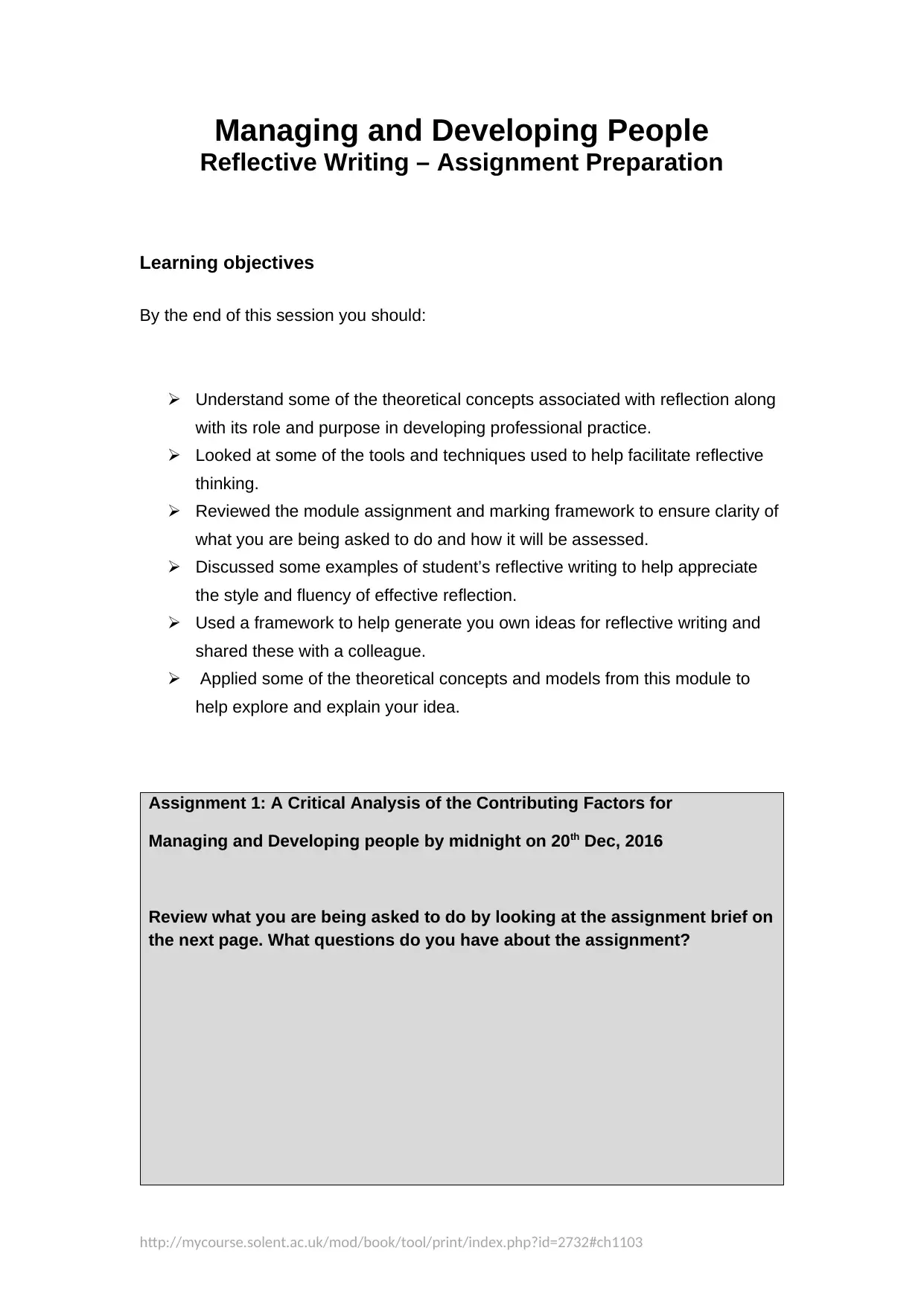
Managing and Developing People
Reflective Writing – Assignment Preparation
Learning objectives
By the end of this session you should:
Understand some of the theoretical concepts associated with reflection along
with its role and purpose in developing professional practice.
Looked at some of the tools and techniques used to help facilitate reflective
thinking.
Reviewed the module assignment and marking framework to ensure clarity of
what you are being asked to do and how it will be assessed.
Discussed some examples of student’s reflective writing to help appreciate
the style and fluency of effective reflection.
Used a framework to help generate you own ideas for reflective writing and
shared these with a colleague.
Applied some of the theoretical concepts and models from this module to
help explore and explain your idea.
Assignment 1: A Critical Analysis of the Contributing Factors for
Managing and Developing people by midnight on 20th Dec, 2016
Review what you are being asked to do by looking at the assignment brief on
the next page. What questions do you have about the assignment?
http://mycourse.solent.ac.uk/mod/book/tool/print/index.php?id=2732#ch1103
Reflective Writing – Assignment Preparation
Learning objectives
By the end of this session you should:
Understand some of the theoretical concepts associated with reflection along
with its role and purpose in developing professional practice.
Looked at some of the tools and techniques used to help facilitate reflective
thinking.
Reviewed the module assignment and marking framework to ensure clarity of
what you are being asked to do and how it will be assessed.
Discussed some examples of student’s reflective writing to help appreciate
the style and fluency of effective reflection.
Used a framework to help generate you own ideas for reflective writing and
shared these with a colleague.
Applied some of the theoretical concepts and models from this module to
help explore and explain your idea.
Assignment 1: A Critical Analysis of the Contributing Factors for
Managing and Developing people by midnight on 20th Dec, 2016
Review what you are being asked to do by looking at the assignment brief on
the next page. What questions do you have about the assignment?
http://mycourse.solent.ac.uk/mod/book/tool/print/index.php?id=2732#ch1103
Paraphrase This Document
Need a fresh take? Get an instant paraphrase of this document with our AI Paraphraser

http://mycourse.solent.ac.uk/mod/book/tool/print/index.php?id=2732#ch1103
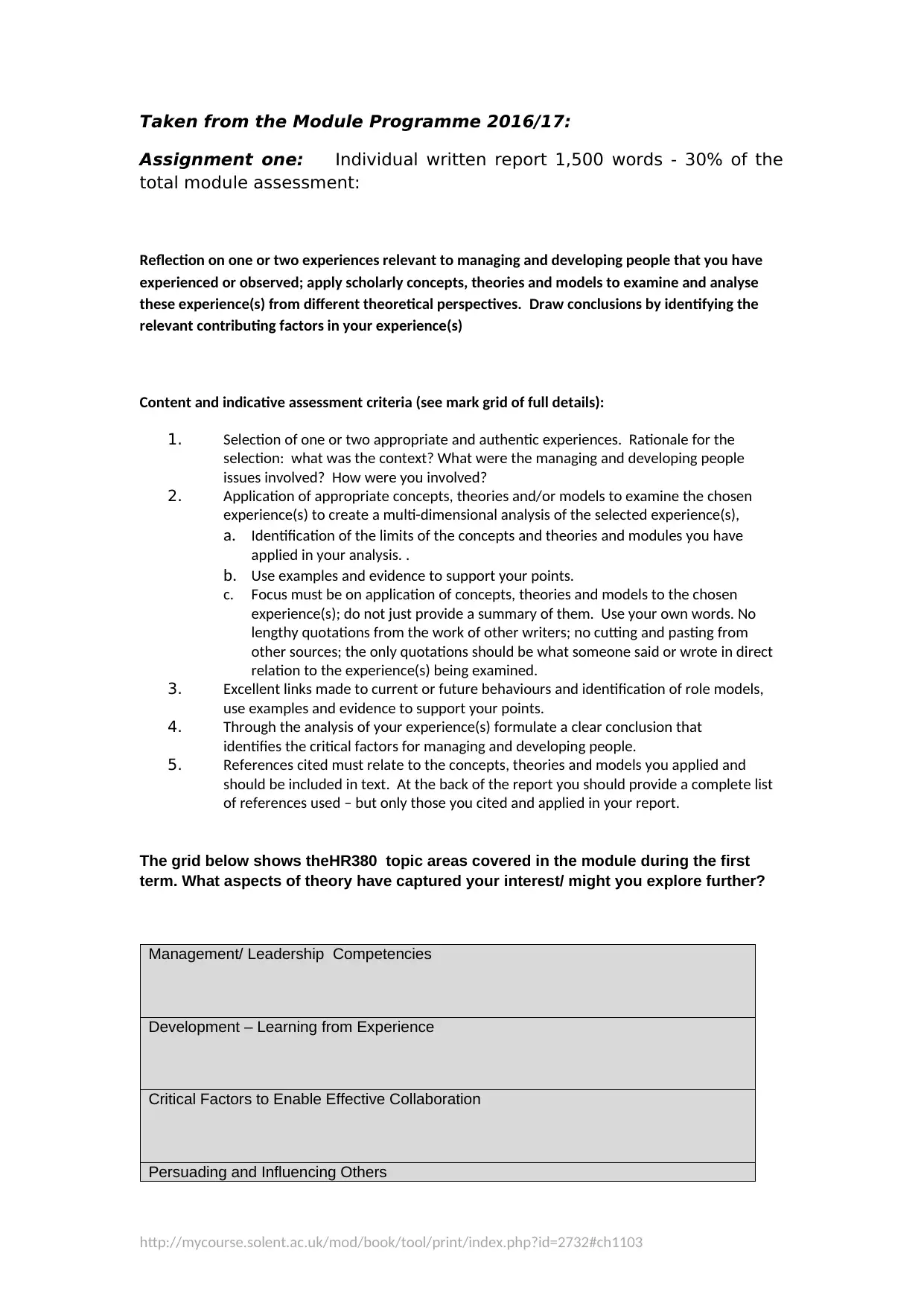
Taken from the Module Programme 2016/17:
Assignment one: Individual written report 1,500 words - 30% of the
total module assessment:
Reflection on one or two experiences relevant to managing and developing people that you have
experienced or observed; apply scholarly concepts, theories and models to examine and analyse
these experience(s) from different theoretical perspectives. Draw conclusions by identifying the
relevant contributing factors in your experience(s)
Content and indicative assessment criteria (see mark grid of full details):
1. Selection of one or two appropriate and authentic experiences. Rationale for the
selection: what was the context? What were the managing and developing people
issues involved? How were you involved?
2. Application of appropriate concepts, theories and/or models to examine the chosen
experience(s) to create a multi-dimensional analysis of the selected experience(s),
a. Identification of the limits of the concepts and theories and modules you have
applied in your analysis. .
b. Use examples and evidence to support your points.
c. Focus must be on application of concepts, theories and models to the chosen
experience(s); do not just provide a summary of them. Use your own words. No
lengthy quotations from the work of other writers; no cutting and pasting from
other sources; the only quotations should be what someone said or wrote in direct
relation to the experience(s) being examined.
3. Excellent links made to current or future behaviours and identification of role models,
use examples and evidence to support your points.
4. Through the analysis of your experience(s) formulate a clear conclusion that
identifies the critical factors for managing and developing people.
5. References cited must relate to the concepts, theories and models you applied and
should be included in text. At the back of the report you should provide a complete list
of references used – but only those you cited and applied in your report.
The grid below shows theHR380 topic areas covered in the module during the first
term. What aspects of theory have captured your interest/ might you explore further?
Management/ Leadership Competencies
Development – Learning from Experience
Critical Factors to Enable Effective Collaboration
Persuading and Influencing Others
http://mycourse.solent.ac.uk/mod/book/tool/print/index.php?id=2732#ch1103
Assignment one: Individual written report 1,500 words - 30% of the
total module assessment:
Reflection on one or two experiences relevant to managing and developing people that you have
experienced or observed; apply scholarly concepts, theories and models to examine and analyse
these experience(s) from different theoretical perspectives. Draw conclusions by identifying the
relevant contributing factors in your experience(s)
Content and indicative assessment criteria (see mark grid of full details):
1. Selection of one or two appropriate and authentic experiences. Rationale for the
selection: what was the context? What were the managing and developing people
issues involved? How were you involved?
2. Application of appropriate concepts, theories and/or models to examine the chosen
experience(s) to create a multi-dimensional analysis of the selected experience(s),
a. Identification of the limits of the concepts and theories and modules you have
applied in your analysis. .
b. Use examples and evidence to support your points.
c. Focus must be on application of concepts, theories and models to the chosen
experience(s); do not just provide a summary of them. Use your own words. No
lengthy quotations from the work of other writers; no cutting and pasting from
other sources; the only quotations should be what someone said or wrote in direct
relation to the experience(s) being examined.
3. Excellent links made to current or future behaviours and identification of role models,
use examples and evidence to support your points.
4. Through the analysis of your experience(s) formulate a clear conclusion that
identifies the critical factors for managing and developing people.
5. References cited must relate to the concepts, theories and models you applied and
should be included in text. At the back of the report you should provide a complete list
of references used – but only those you cited and applied in your report.
The grid below shows theHR380 topic areas covered in the module during the first
term. What aspects of theory have captured your interest/ might you explore further?
Management/ Leadership Competencies
Development – Learning from Experience
Critical Factors to Enable Effective Collaboration
Persuading and Influencing Others
http://mycourse.solent.ac.uk/mod/book/tool/print/index.php?id=2732#ch1103
⊘ This is a preview!⊘
Do you want full access?
Subscribe today to unlock all pages.

Trusted by 1+ million students worldwide
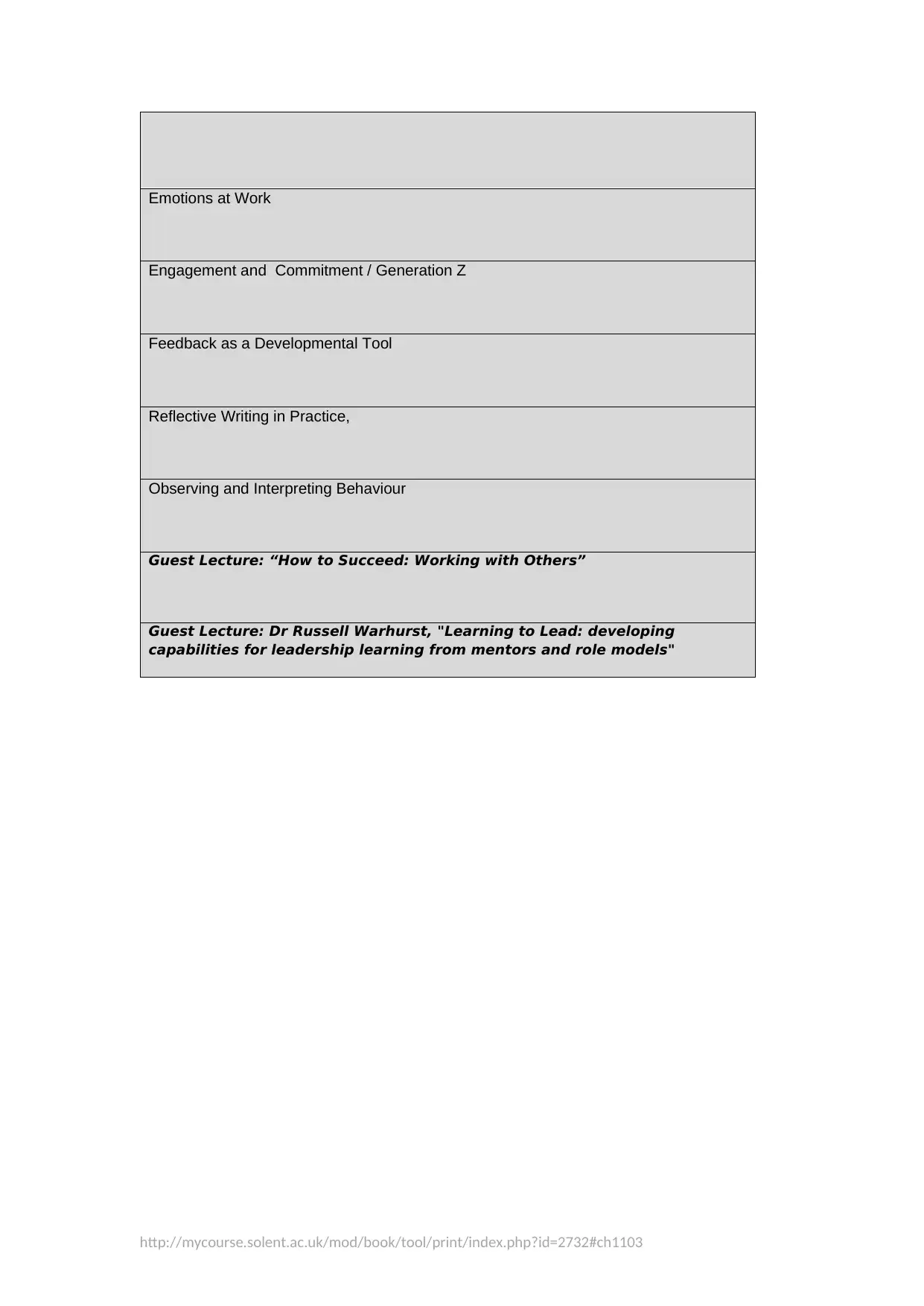
Emotions at Work
Engagement and Commitment / Generation Z
Feedback as a Developmental Tool
Reflective Writing in Practice,
Observing and Interpreting Behaviour
Guest Lecture: “How to Succeed: Working with Others”
Guest Lecture: Dr Russell Warhurst, "Learning to Lead: developing
capabilities for leadership learning from mentors and role models"
http://mycourse.solent.ac.uk/mod/book/tool/print/index.php?id=2732#ch1103
Engagement and Commitment / Generation Z
Feedback as a Developmental Tool
Reflective Writing in Practice,
Observing and Interpreting Behaviour
Guest Lecture: “How to Succeed: Working with Others”
Guest Lecture: Dr Russell Warhurst, "Learning to Lead: developing
capabilities for leadership learning from mentors and role models"
http://mycourse.solent.ac.uk/mod/book/tool/print/index.php?id=2732#ch1103
Paraphrase This Document
Need a fresh take? Get an instant paraphrase of this document with our AI Paraphraser
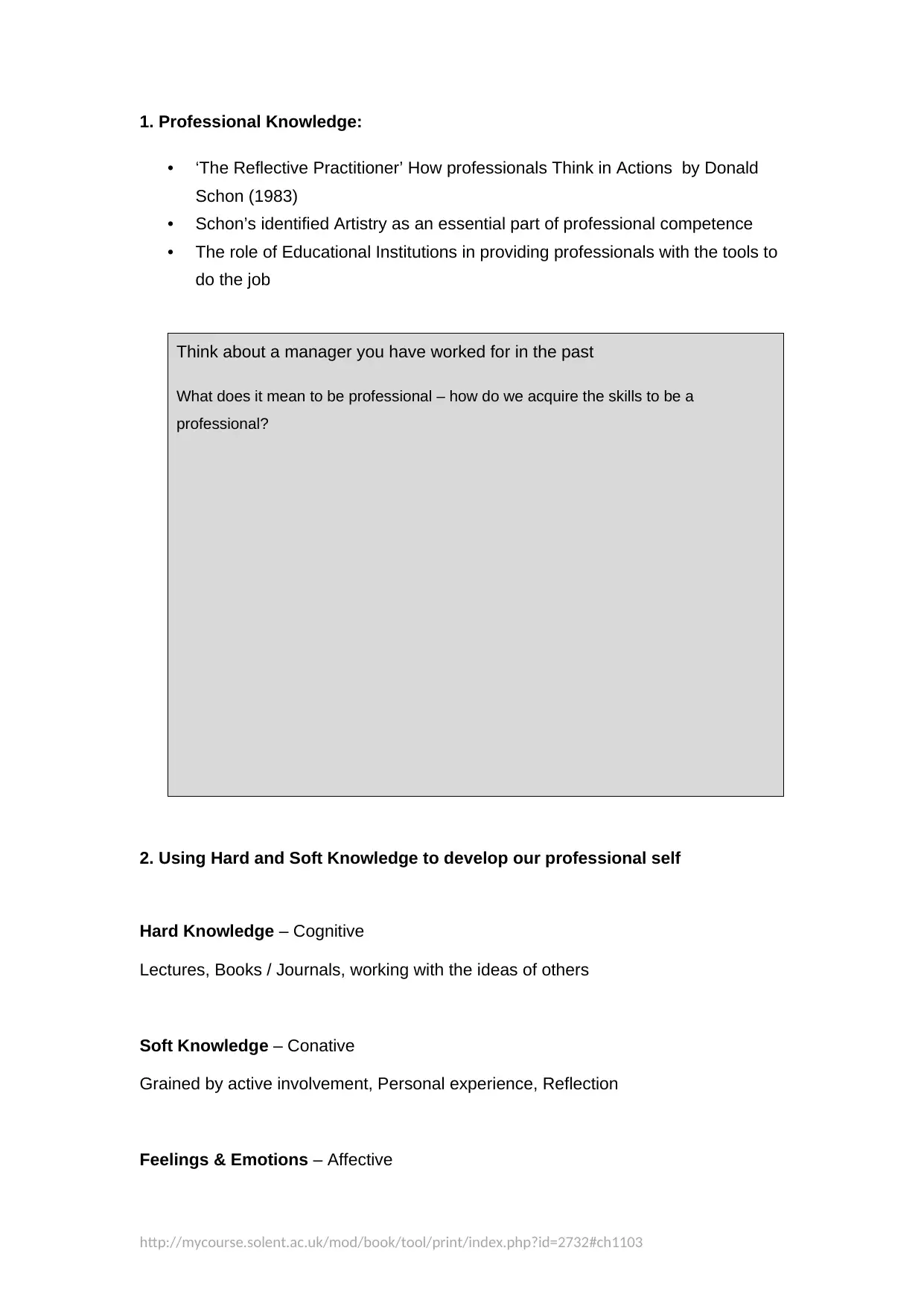
1. Professional Knowledge:
• ‘The Reflective Practitioner’ How professionals Think in Actions by Donald
Schon (1983)
• Schon’s identified Artistry as an essential part of professional competence
• The role of Educational Institutions in providing professionals with the tools to
do the job
Think about a manager you have worked for in the past
What does it mean to be professional – how do we acquire the skills to be a
professional?
2. Using Hard and Soft Knowledge to develop our professional self
Hard Knowledge – Cognitive
Lectures, Books / Journals, working with the ideas of others
Soft Knowledge – Conative
Grained by active involvement, Personal experience, Reflection
Feelings & Emotions – Affective
http://mycourse.solent.ac.uk/mod/book/tool/print/index.php?id=2732#ch1103
• ‘The Reflective Practitioner’ How professionals Think in Actions by Donald
Schon (1983)
• Schon’s identified Artistry as an essential part of professional competence
• The role of Educational Institutions in providing professionals with the tools to
do the job
Think about a manager you have worked for in the past
What does it mean to be professional – how do we acquire the skills to be a
professional?
2. Using Hard and Soft Knowledge to develop our professional self
Hard Knowledge – Cognitive
Lectures, Books / Journals, working with the ideas of others
Soft Knowledge – Conative
Grained by active involvement, Personal experience, Reflection
Feelings & Emotions – Affective
http://mycourse.solent.ac.uk/mod/book/tool/print/index.php?id=2732#ch1103
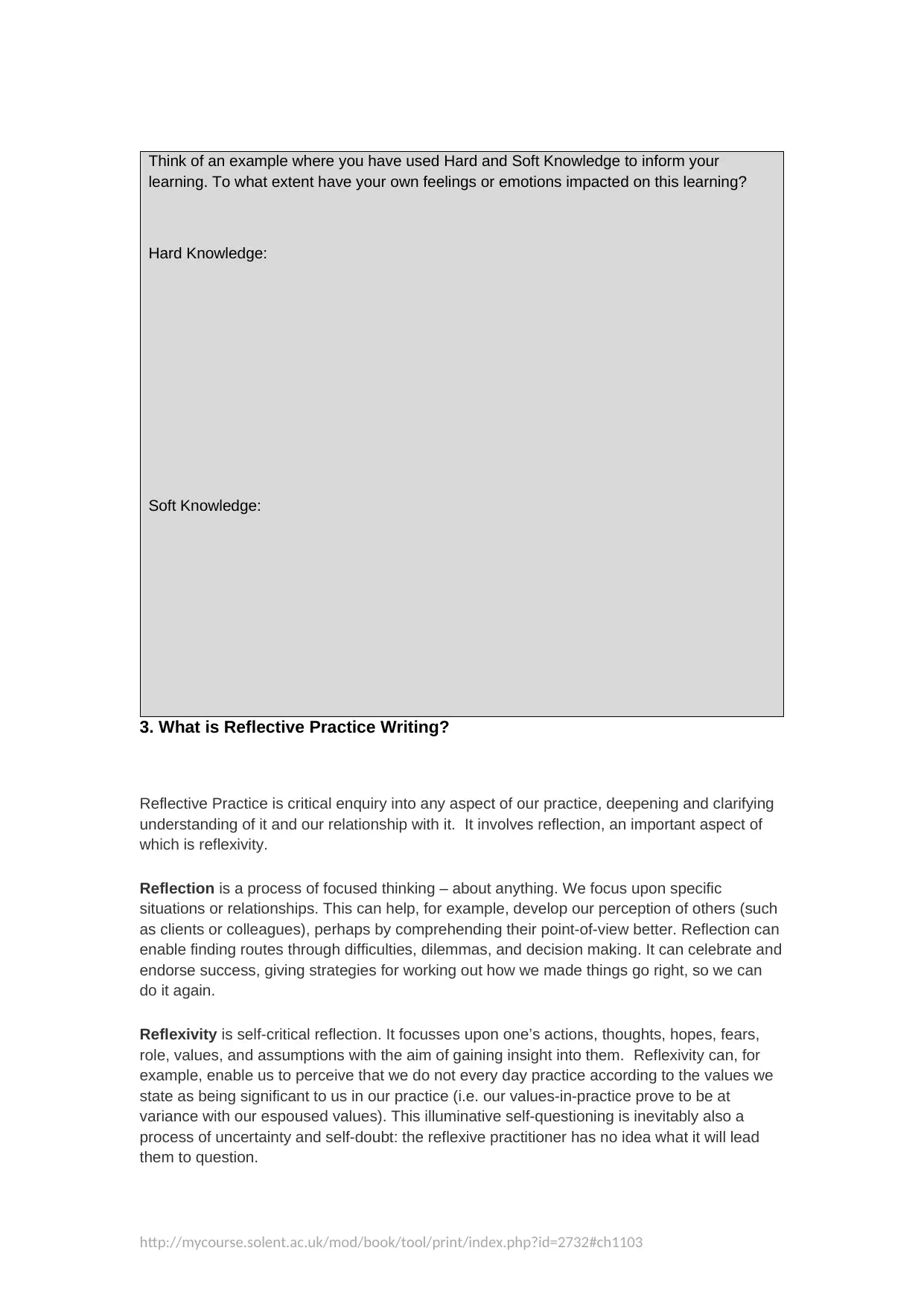
Think of an example where you have used Hard and Soft Knowledge to inform your
learning. To what extent have your own feelings or emotions impacted on this learning?
Hard Knowledge:
Soft Knowledge:
3. What is Reflective Practice Writing?
Reflective Practice is critical enquiry into any aspect of our practice, deepening and clarifying
understanding of it and our relationship with it. It involves reflection, an important aspect of
which is reflexivity.
Reflection is a process of focused thinking – about anything. We focus upon specific
situations or relationships. This can help, for example, develop our perception of others (such
as clients or colleagues), perhaps by comprehending their point-of-view better. Reflection can
enable finding routes through difficulties, dilemmas, and decision making. It can celebrate and
endorse success, giving strategies for working out how we made things go right, so we can
do it again.
Reflexivity is self-critical reflection. It focusses upon one’s actions, thoughts, hopes, fears,
role, values, and assumptions with the aim of gaining insight into them. Reflexivity can, for
example, enable us to perceive that we do not every day practice according to the values we
state as being significant to us in our practice (i.e. our values-in-practice prove to be at
variance with our espoused values). This illuminative self-questioning is inevitably also a
process of uncertainty and self-doubt: the reflexive practitioner has no idea what it will lead
them to question.
http://mycourse.solent.ac.uk/mod/book/tool/print/index.php?id=2732#ch1103
learning. To what extent have your own feelings or emotions impacted on this learning?
Hard Knowledge:
Soft Knowledge:
3. What is Reflective Practice Writing?
Reflective Practice is critical enquiry into any aspect of our practice, deepening and clarifying
understanding of it and our relationship with it. It involves reflection, an important aspect of
which is reflexivity.
Reflection is a process of focused thinking – about anything. We focus upon specific
situations or relationships. This can help, for example, develop our perception of others (such
as clients or colleagues), perhaps by comprehending their point-of-view better. Reflection can
enable finding routes through difficulties, dilemmas, and decision making. It can celebrate and
endorse success, giving strategies for working out how we made things go right, so we can
do it again.
Reflexivity is self-critical reflection. It focusses upon one’s actions, thoughts, hopes, fears,
role, values, and assumptions with the aim of gaining insight into them. Reflexivity can, for
example, enable us to perceive that we do not every day practice according to the values we
state as being significant to us in our practice (i.e. our values-in-practice prove to be at
variance with our espoused values). This illuminative self-questioning is inevitably also a
process of uncertainty and self-doubt: the reflexive practitioner has no idea what it will lead
them to question.
http://mycourse.solent.ac.uk/mod/book/tool/print/index.php?id=2732#ch1103
⊘ This is a preview!⊘
Do you want full access?
Subscribe today to unlock all pages.

Trusted by 1+ million students worldwide
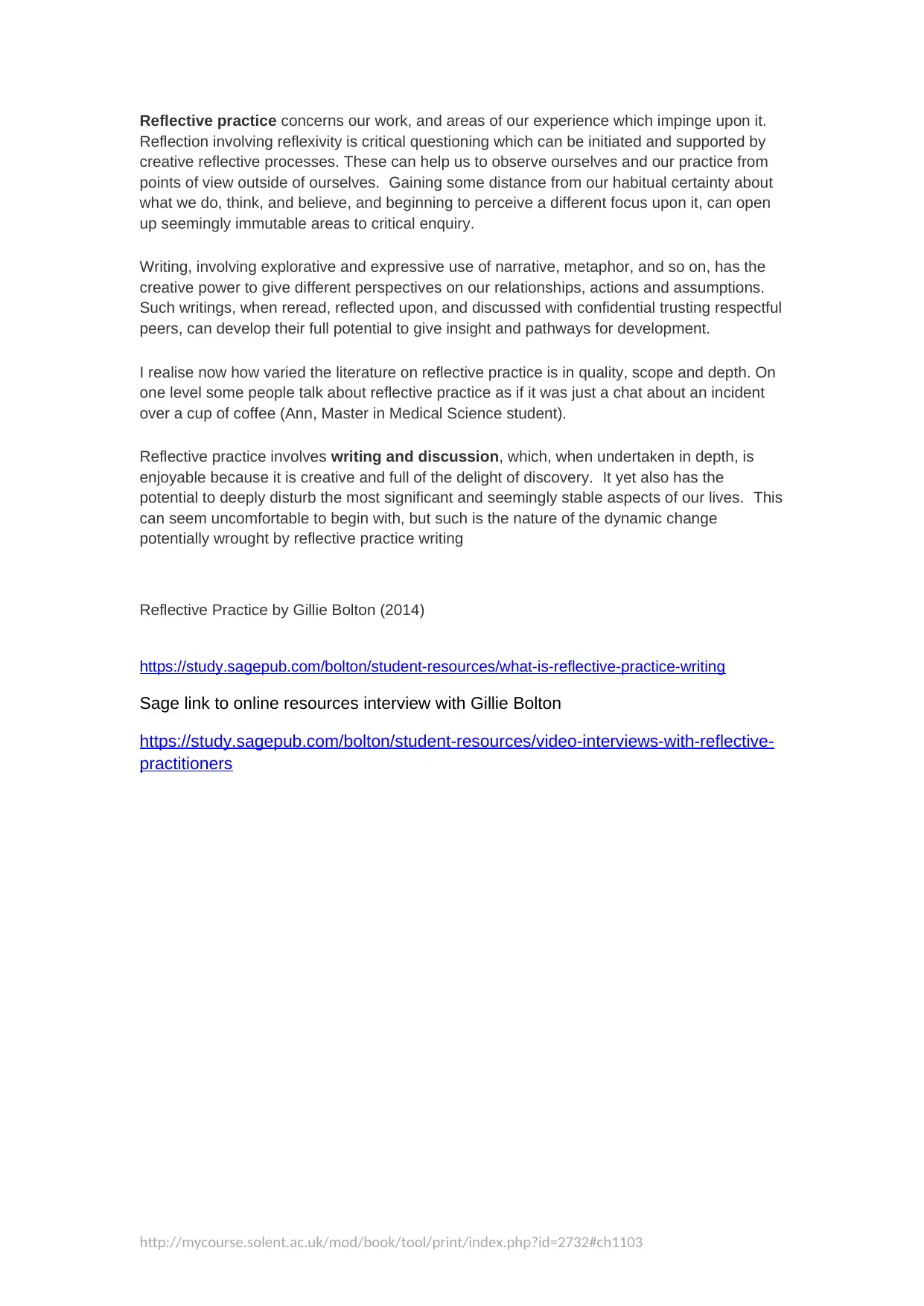
Reflective practice concerns our work, and areas of our experience which impinge upon it.
Reflection involving reflexivity is critical questioning which can be initiated and supported by
creative reflective processes. These can help us to observe ourselves and our practice from
points of view outside of ourselves. Gaining some distance from our habitual certainty about
what we do, think, and believe, and beginning to perceive a different focus upon it, can open
up seemingly immutable areas to critical enquiry.
Writing, involving explorative and expressive use of narrative, metaphor, and so on, has the
creative power to give different perspectives on our relationships, actions and assumptions.
Such writings, when reread, reflected upon, and discussed with confidential trusting respectful
peers, can develop their full potential to give insight and pathways for development.
I realise now how varied the literature on reflective practice is in quality, scope and depth. On
one level some people talk about reflective practice as if it was just a chat about an incident
over a cup of coffee (Ann, Master in Medical Science student).
Reflective practice involves writing and discussion, which, when undertaken in depth, is
enjoyable because it is creative and full of the delight of discovery. It yet also has the
potential to deeply disturb the most significant and seemingly stable aspects of our lives. This
can seem uncomfortable to begin with, but such is the nature of the dynamic change
potentially wrought by reflective practice writing
Reflective Practice by Gillie Bolton (2014)
https://study.sagepub.com/bolton/student-resources/what-is-reflective-practice-writing
Sage link to online resources interview with Gillie Bolton
https://study.sagepub.com/bolton/student-resources/video-interviews-with-reflective-
practitioners
http://mycourse.solent.ac.uk/mod/book/tool/print/index.php?id=2732#ch1103
Reflection involving reflexivity is critical questioning which can be initiated and supported by
creative reflective processes. These can help us to observe ourselves and our practice from
points of view outside of ourselves. Gaining some distance from our habitual certainty about
what we do, think, and believe, and beginning to perceive a different focus upon it, can open
up seemingly immutable areas to critical enquiry.
Writing, involving explorative and expressive use of narrative, metaphor, and so on, has the
creative power to give different perspectives on our relationships, actions and assumptions.
Such writings, when reread, reflected upon, and discussed with confidential trusting respectful
peers, can develop their full potential to give insight and pathways for development.
I realise now how varied the literature on reflective practice is in quality, scope and depth. On
one level some people talk about reflective practice as if it was just a chat about an incident
over a cup of coffee (Ann, Master in Medical Science student).
Reflective practice involves writing and discussion, which, when undertaken in depth, is
enjoyable because it is creative and full of the delight of discovery. It yet also has the
potential to deeply disturb the most significant and seemingly stable aspects of our lives. This
can seem uncomfortable to begin with, but such is the nature of the dynamic change
potentially wrought by reflective practice writing
Reflective Practice by Gillie Bolton (2014)
https://study.sagepub.com/bolton/student-resources/what-is-reflective-practice-writing
Sage link to online resources interview with Gillie Bolton
https://study.sagepub.com/bolton/student-resources/video-interviews-with-reflective-
practitioners
http://mycourse.solent.ac.uk/mod/book/tool/print/index.php?id=2732#ch1103
Paraphrase This Document
Need a fresh take? Get an instant paraphrase of this document with our AI Paraphraser
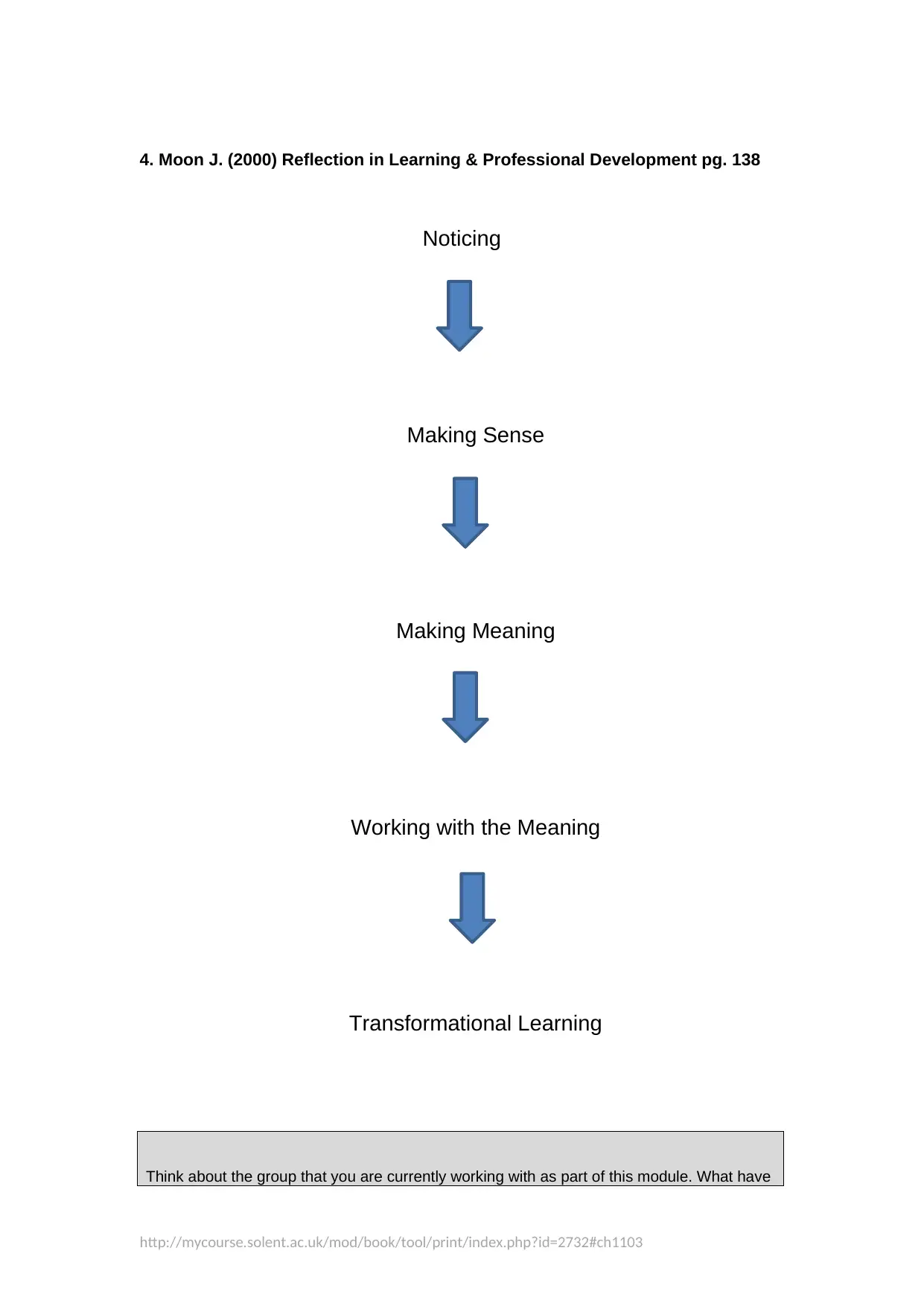
4. Moon J. (2000) Reflection in Learning & Professional Development pg. 138
Noticing
Making Sense
Making Meaning
Working with the Meaning
Transformational Learning
Think about the group that you are currently working with as part of this module. What have
http://mycourse.solent.ac.uk/mod/book/tool/print/index.php?id=2732#ch1103
Noticing
Making Sense
Making Meaning
Working with the Meaning
Transformational Learning
Think about the group that you are currently working with as part of this module. What have
http://mycourse.solent.ac.uk/mod/book/tool/print/index.php?id=2732#ch1103
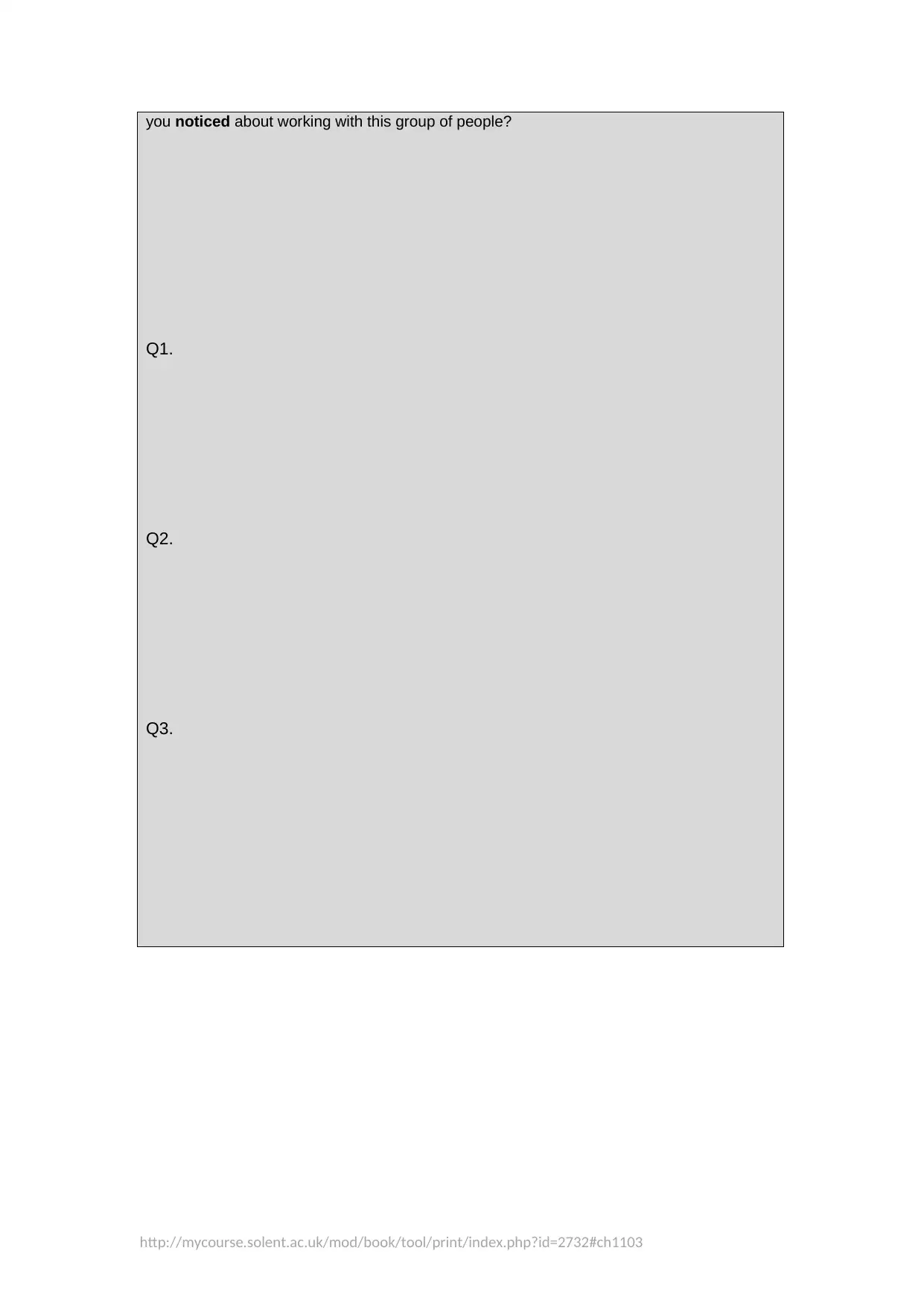
you noticed about working with this group of people?
Q1.
Q2.
Q3.
http://mycourse.solent.ac.uk/mod/book/tool/print/index.php?id=2732#ch1103
Q1.
Q2.
Q3.
http://mycourse.solent.ac.uk/mod/book/tool/print/index.php?id=2732#ch1103
⊘ This is a preview!⊘
Do you want full access?
Subscribe today to unlock all pages.

Trusted by 1+ million students worldwide
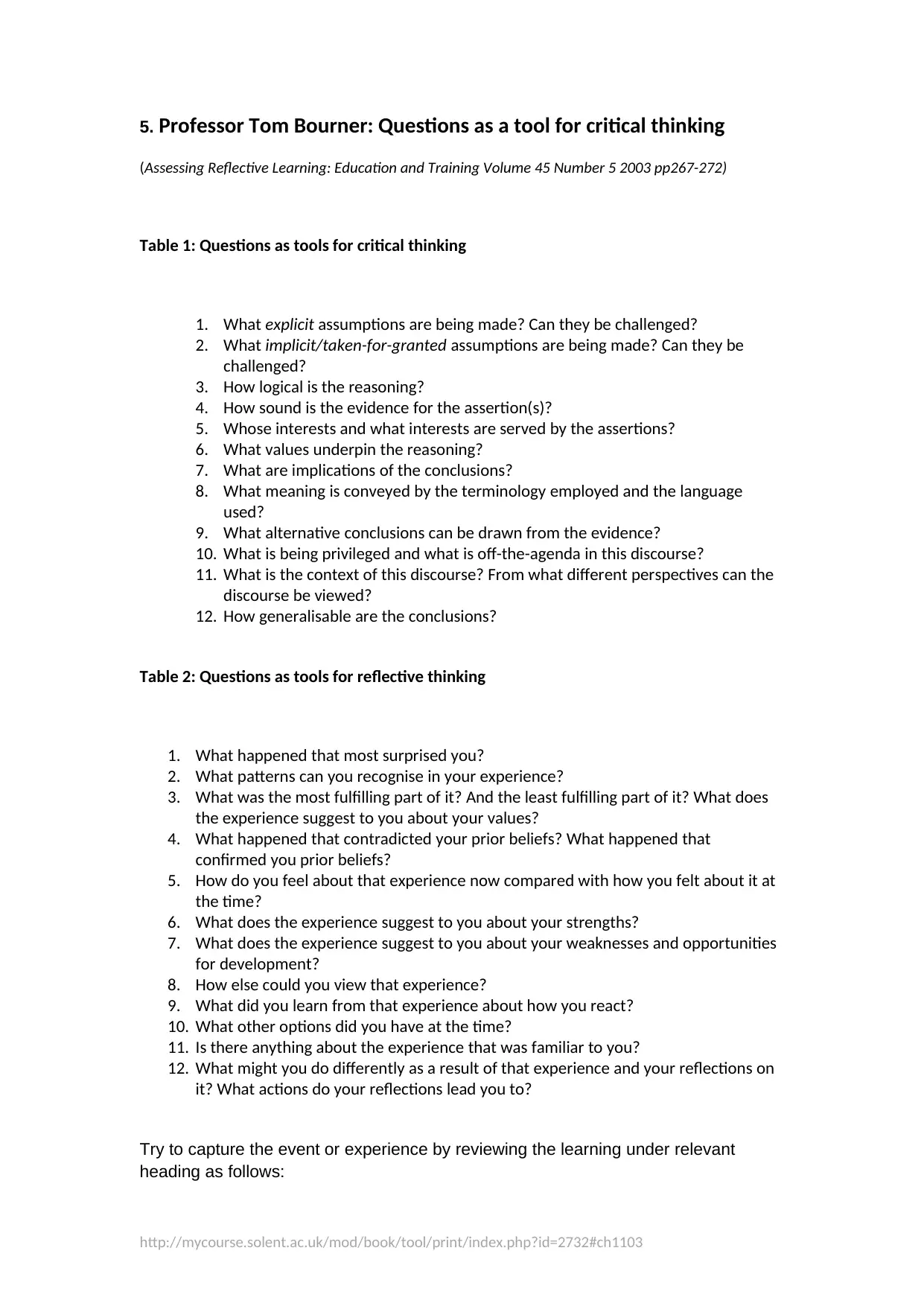
5. Professor Tom Bourner: Questions as a tool for critical thinking
(Assessing Reflective Learning: Education and Training Volume 45 Number 5 2003 pp267-272)
Table 1: Questions as tools for critical thinking
1. What explicit assumptions are being made? Can they be challenged?
2. What implicit/taken-for-granted assumptions are being made? Can they be
challenged?
3. How logical is the reasoning?
4. How sound is the evidence for the assertion(s)?
5. Whose interests and what interests are served by the assertions?
6. What values underpin the reasoning?
7. What are implications of the conclusions?
8. What meaning is conveyed by the terminology employed and the language
used?
9. What alternative conclusions can be drawn from the evidence?
10. What is being privileged and what is off-the-agenda in this discourse?
11. What is the context of this discourse? From what different perspectives can the
discourse be viewed?
12. How generalisable are the conclusions?
Table 2: Questions as tools for reflective thinking
1. What happened that most surprised you?
2. What patterns can you recognise in your experience?
3. What was the most fulfilling part of it? And the least fulfilling part of it? What does
the experience suggest to you about your values?
4. What happened that contradicted your prior beliefs? What happened that
confirmed you prior beliefs?
5. How do you feel about that experience now compared with how you felt about it at
the time?
6. What does the experience suggest to you about your strengths?
7. What does the experience suggest to you about your weaknesses and opportunities
for development?
8. How else could you view that experience?
9. What did you learn from that experience about how you react?
10. What other options did you have at the time?
11. Is there anything about the experience that was familiar to you?
12. What might you do differently as a result of that experience and your reflections on
it? What actions do your reflections lead you to?
Try to capture the event or experience by reviewing the learning under relevant
heading as follows:
http://mycourse.solent.ac.uk/mod/book/tool/print/index.php?id=2732#ch1103
(Assessing Reflective Learning: Education and Training Volume 45 Number 5 2003 pp267-272)
Table 1: Questions as tools for critical thinking
1. What explicit assumptions are being made? Can they be challenged?
2. What implicit/taken-for-granted assumptions are being made? Can they be
challenged?
3. How logical is the reasoning?
4. How sound is the evidence for the assertion(s)?
5. Whose interests and what interests are served by the assertions?
6. What values underpin the reasoning?
7. What are implications of the conclusions?
8. What meaning is conveyed by the terminology employed and the language
used?
9. What alternative conclusions can be drawn from the evidence?
10. What is being privileged and what is off-the-agenda in this discourse?
11. What is the context of this discourse? From what different perspectives can the
discourse be viewed?
12. How generalisable are the conclusions?
Table 2: Questions as tools for reflective thinking
1. What happened that most surprised you?
2. What patterns can you recognise in your experience?
3. What was the most fulfilling part of it? And the least fulfilling part of it? What does
the experience suggest to you about your values?
4. What happened that contradicted your prior beliefs? What happened that
confirmed you prior beliefs?
5. How do you feel about that experience now compared with how you felt about it at
the time?
6. What does the experience suggest to you about your strengths?
7. What does the experience suggest to you about your weaknesses and opportunities
for development?
8. How else could you view that experience?
9. What did you learn from that experience about how you react?
10. What other options did you have at the time?
11. Is there anything about the experience that was familiar to you?
12. What might you do differently as a result of that experience and your reflections on
it? What actions do your reflections lead you to?
Try to capture the event or experience by reviewing the learning under relevant
heading as follows:
http://mycourse.solent.ac.uk/mod/book/tool/print/index.php?id=2732#ch1103
Paraphrase This Document
Need a fresh take? Get an instant paraphrase of this document with our AI Paraphraser
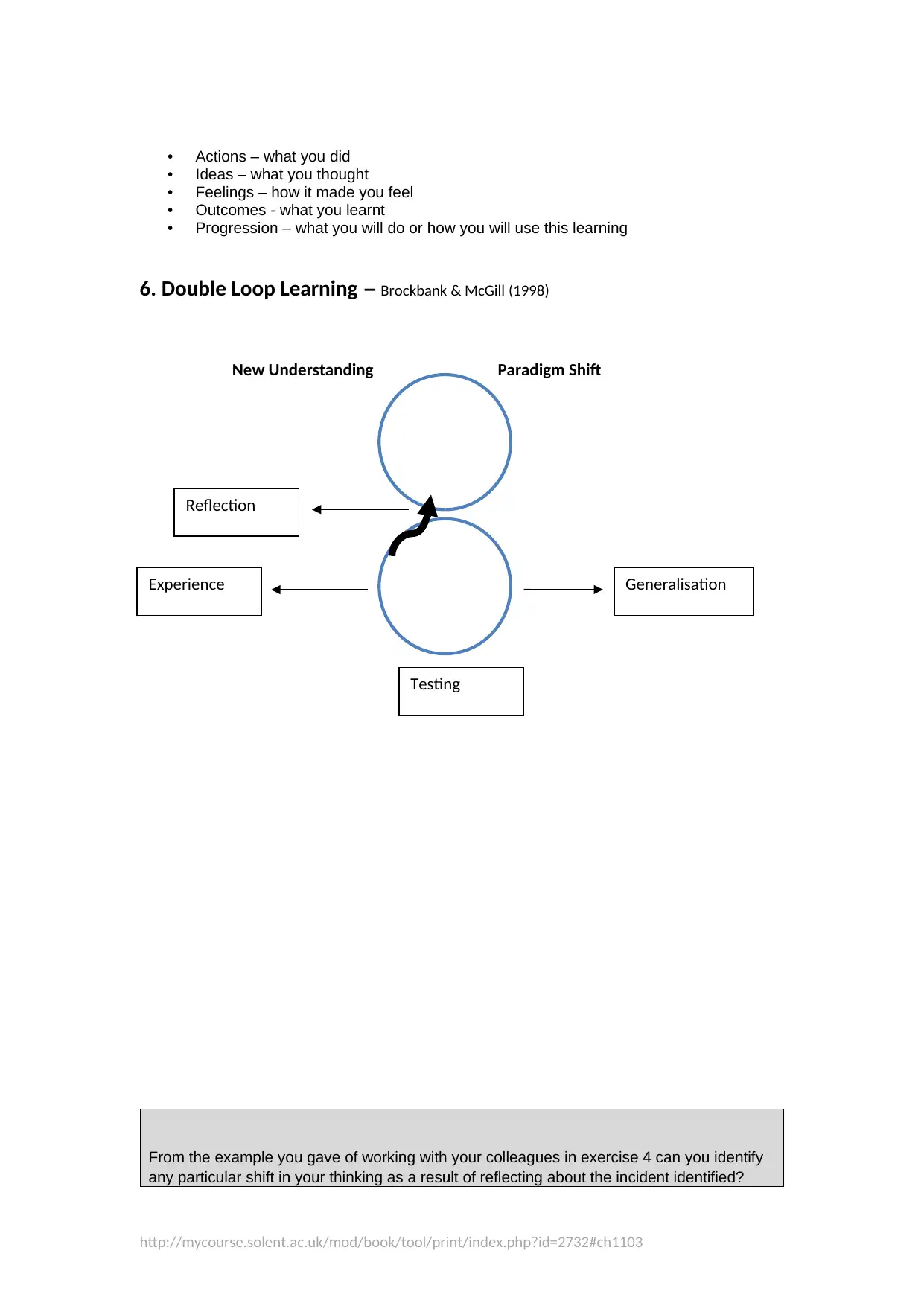
• Actions – what you did
• Ideas – what you thought
• Feelings – how it made you feel
• Outcomes - what you learnt
• Progression – what you will do or how you will use this learning
6. Double Loop Learning – Brockbank & McGill (1998)
New Understanding Paradigm Shift
From the example you gave of working with your colleagues in exercise 4 can you identify
any particular shift in your thinking as a result of reflecting about the incident identified?
http://mycourse.solent.ac.uk/mod/book/tool/print/index.php?id=2732#ch1103
Reflection
Experience Generalisation
Testing
• Ideas – what you thought
• Feelings – how it made you feel
• Outcomes - what you learnt
• Progression – what you will do or how you will use this learning
6. Double Loop Learning – Brockbank & McGill (1998)
New Understanding Paradigm Shift
From the example you gave of working with your colleagues in exercise 4 can you identify
any particular shift in your thinking as a result of reflecting about the incident identified?
http://mycourse.solent.ac.uk/mod/book/tool/print/index.php?id=2732#ch1103
Reflection
Experience Generalisation
Testing
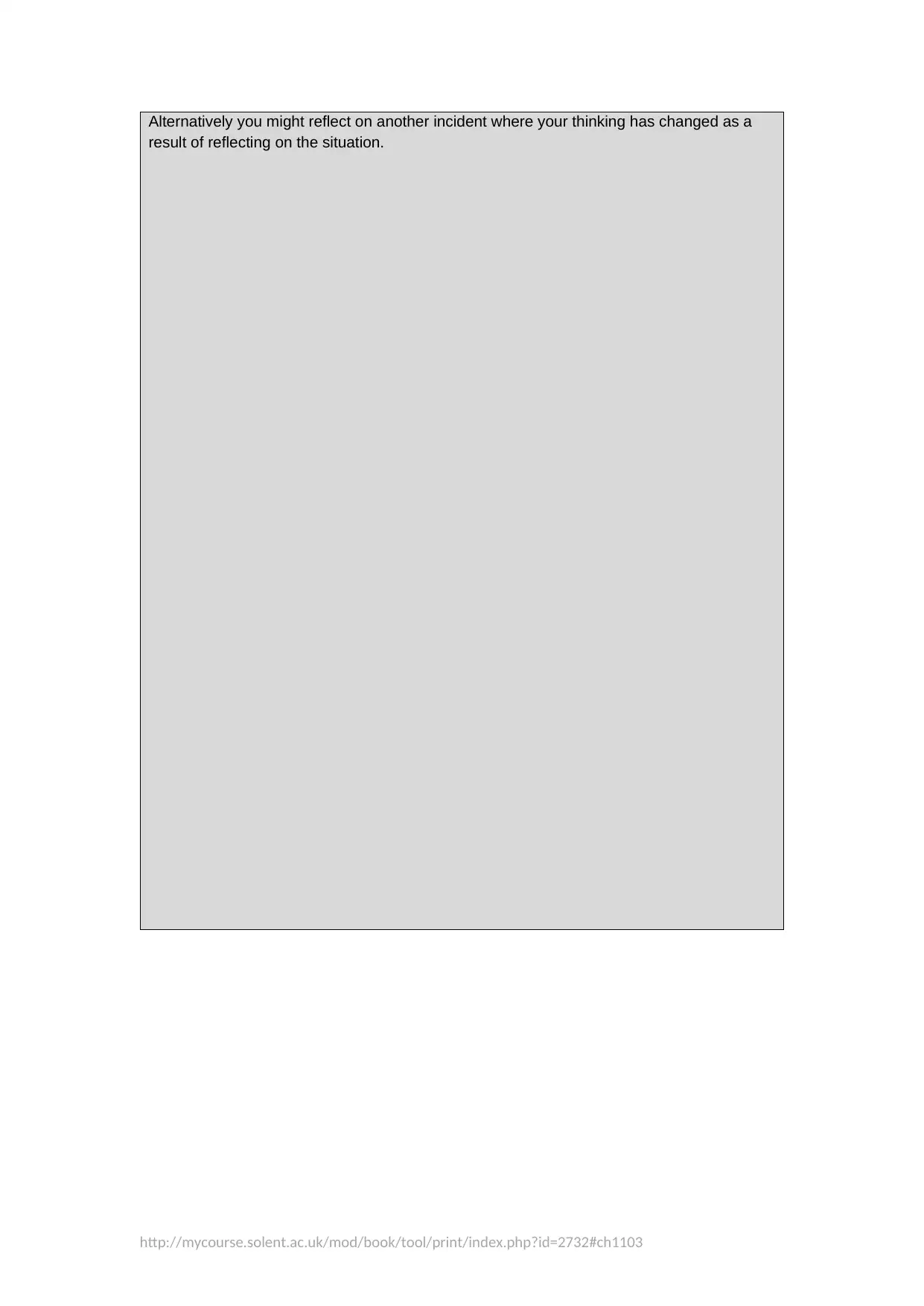
Alternatively you might reflect on another incident where your thinking has changed as a
result of reflecting on the situation.
http://mycourse.solent.ac.uk/mod/book/tool/print/index.php?id=2732#ch1103
result of reflecting on the situation.
http://mycourse.solent.ac.uk/mod/book/tool/print/index.php?id=2732#ch1103
⊘ This is a preview!⊘
Do you want full access?
Subscribe today to unlock all pages.

Trusted by 1+ million students worldwide
1 out of 39
Related Documents
Your All-in-One AI-Powered Toolkit for Academic Success.
+13062052269
info@desklib.com
Available 24*7 on WhatsApp / Email
![[object Object]](/_next/static/media/star-bottom.7253800d.svg)
Unlock your academic potential
Copyright © 2020–2026 A2Z Services. All Rights Reserved. Developed and managed by ZUCOL.




